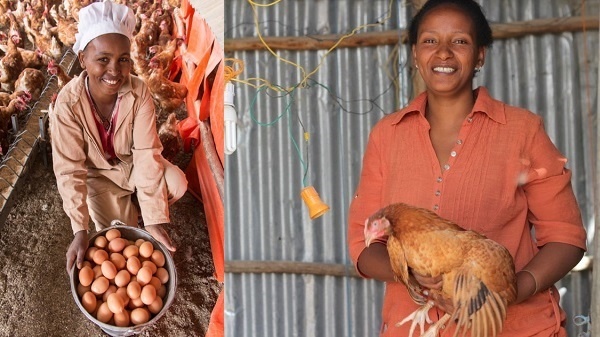
The USAID-funded program links poultry farmers at the start-up stage to established commercial producers and pullet growers to share experiences, learn good husbandry practices, and understand the input market value chain
(Fintrac Inc./Ethiopia VCA) – Feed the Future Ethiopia Value Chain Activity (VCA) is working to strengthen the commercial relationships between pullet multiplication centers, growers, large layer producers, and small-scale farms through a pilot mentorship and peer learning initiative.
The program links youth and women at the start-up stage to established commercial producers and pullet growers to share experiences, learn good husbandry practices, and understand the input market value chain. It also aims to improve access to information, input supplies, and resources by creating business partnerships between mentees and mentors.
The mentorship and peer learning initiative, launched in April 2019, is currently supporting 269 mentees to understand entrepreneurship, build their confidence, and share decision-making practices. “Given the right resources, I have learned that the poultry sector has great potential and the demand is always growing. I believe I will be profitable in this business, and my mentor is a great support in showing me the right way and providing me with improved breed pullets,” said Azeb Haile, a mentee in Tigray region.
Mentees’ selection criteria are mainly focused on qualities such as demonstrated interest and commitment to the sector. “This has been a great experience so far,” said Azeb. “I learned about the input value chain and the importance of improved breeds, good husbandry practices, and good business ethics to be successful. I have already sold 300 chickens and made more than 50 percent profit from each chicken.”
Mebrhit Gebre, a pullet grower in Tigray, knows the challenges of starting a poultry business. “I have been there,” she said. “When I first started the business I didn’t have the bigger picture, I did not know what comes first and last and had to turn to a friend who showed me the basics on what to do. This is why I believe the peer learning initiative is a perfect approach.”
She is now mentoring 10 young poultry farmers in her village, helping them to survive the start-up phase of the business. Based on the training from VCA on peer learning, Mebrihit regularly visits her mentees and works with them to solve their challenges on the way. She also supplies improved 45-day-old chickens to her mentees.
The initiative also admits those who already joined the poultry business but are faced with limitations. Etaferahu Mulu, in Amhara Enosa Kebele, was challenged with low yield that affected her egg business. “My chickens used to lay eggs every other day and I did not know why or what to do,” said Etaferahu. “Once I joined the mentorship program, I learned from my mentor that the type of feed I was preparing was affecting my chickens’ laying ability. I started mixing green, local, and improved feed, and immediately I saw improvements. Now I collect 35 to 40 eggs every day.”
Mentors and mentees are from the same village to ensure easy and regular access for meetings, demonstrations, and trainings. “I check up on my mentees; I bring them to my farm and show them how to properly manage a poultry house, prepare feed, and regularly share any information available. It makes it easier because all my mentees are found in the same area. There is so much we can do in the sector because the demand is always higher than the supply,” said Rahel Mulatu, a mentor from Oromia.
The mentors are established pullet growers and poultry farmers, considered successful in the business, who are well informed, networked, and willing to support others to join the business. VCA provides regular training and follow up to update the mentors’ technical and entrepreneurial skills so they are able to stay strong role models in the sector.
To make sure pullet growers have regular access for improved day-old chickens, feed, veterinary services and training, VCA is working to formalize a relationship with four multiplication centers. Ethio Chicken in Tigray, Gerado Poultry Farm in Amhara, Alema Farm in Oromia, and Hawassa Poultry Farm in SNNPR will work with VCA to select, support, and build the capacity of pullet growers, as well as provide feed, regular trainings, and market linkages. This partnership will also promote scientific pullet growing and chicken rearing among youth and help them see the business potential of the sector.
Source: Fintrac Inc.
